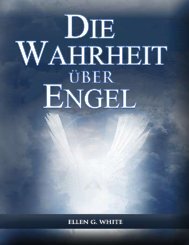Finishing the Race
Of all the games instituted among the Greeks and the Romans, the races were the most ancient and the most highly esteemed … The contests were governed by strict regulations, from which there was no appeal. Those who desired their names entered as competitors for the prize had first to undergo a severe preparatory training. Harmful indulgence of appetite, or any other gratification that would lower mental or physical vigour, was strictly forbidden. For one to have any hope of success in these trials of strength and speed, the muscles must be strong and supple, and the nerves well under control. Every movement must be certain, every step swift and unswerving; the physical powers must reach the highest mark.
Of all the games instituted among the Greeks and the Romans, the races were the most ancient and the most highly esteemed … The contests were governed by strict regulations, from which there was no appeal. Those who desired their names entered as competitors for the prize had first to undergo a severe preparatory training. Harmful indulgence of appetite, or any other gratification that would lower mental or physical vigour, was strictly forbidden. For one to have any hope of success in these trials of strength and speed, the muscles must be strong and supple, and the nerves well under control. Every movement must be certain, every step swift and unswerving; the physical powers must reach the highest mark.
You also want an ePaper? Increase the reach of your titles
YUMPU automatically turns print PDFs into web optimized ePapers that Google loves.
But if <strong>the</strong> dead are already enjoying <strong>the</strong> bliss of heaven or writhing in <strong>the</strong> flames of hell,<br />
what need of a future judgment? The teachings of God's word on <strong>the</strong>se important points are<br />
nei<strong>the</strong>r obscure nor contradictory; <strong>the</strong>y may be understood by common minds. But what<br />
candid mind can see ei<strong>the</strong>r wisdom or justice in <strong>the</strong> current <strong>the</strong>ory? Will <strong>the</strong> righteous, after<br />
<strong>the</strong> investigation of <strong>the</strong>ir cases at <strong>the</strong> judgment, receive <strong>the</strong> commendation, "Well done, thou<br />
good and faithful servant: . . . enter thou into <strong>the</strong> joy of thy Lord," when <strong>the</strong>y have been<br />
dwelling in His presence, perhaps for long ages? Are <strong>the</strong> wicked summoned from <strong>the</strong> place<br />
of torment to receive sentence from <strong>the</strong> Judge of all <strong>the</strong> earth: "Depart from Me, ye cursed,<br />
into everlasting fire"? Mat<strong>the</strong>w 25:21, 41. Oh, solemn mockery! shameful impeachment of<br />
<strong>the</strong> wisdom and justice of God!<br />
The <strong>the</strong>ory of <strong>the</strong> immortality of <strong>the</strong> soul was one of those false doctrines that Rome,<br />
borrowing from paganism, incorporated into <strong>the</strong> religion of Christendom. Martin Lu<strong>the</strong>r<br />
classed it with <strong>the</strong> "monstrous fables that form part of <strong>the</strong> Roman dunghill of decretals."--E.<br />
Petavel, The Problem of Immortality, page 255. Commenting on <strong>the</strong> words of Solomon in<br />
Ecclesiastes, that <strong>the</strong> dead know not anything, <strong>the</strong> Reformer says: "Ano<strong>the</strong>r place proving<br />
that <strong>the</strong> dead have no . . . feeling. There is, saith he, no duty, no science, no knowledge, no<br />
wisdom <strong>the</strong>re. Solomon judgeth that <strong>the</strong> dead are asleep, and feel nothing at all. For <strong>the</strong> dead<br />
lie <strong>the</strong>re, accounting nei<strong>the</strong>r days nor years, but when <strong>the</strong>y are awaked, <strong>the</strong>y shall seem to<br />
have slept scarce one minute."-- Martin Lu<strong>the</strong>r, Exposition of Solomon's Booke Called<br />
Ecclesiastes, page 152.<br />
Nowhere in <strong>the</strong> Sacred Scriptures is found <strong>the</strong> statement that <strong>the</strong> righteous go to <strong>the</strong>ir<br />
reward or <strong>the</strong> wicked to <strong>the</strong>ir punishment at death. The patriarchs and prophets have left no<br />
such assurance. Christ and His apostles have given no hint of it. The Bible clearly teaches<br />
that <strong>the</strong> dead do not go immediately to heaven. They are represented as sleeping until <strong>the</strong><br />
resurrection. I Thessalonians 4:14; Job 14:10-12. In <strong>the</strong> very day when <strong>the</strong> silver cord is<br />
loosed and <strong>the</strong> golden bowl broken (Ecclesiastes 12:6), man's thoughts perish. They that go<br />
down to <strong>the</strong> grave are in silence. They know no more of anything that is done under <strong>the</strong> sun.<br />
Job 14:21. Blessed rest for <strong>the</strong> weary righteous!<br />
Time, be it long or short, is but a moment to <strong>the</strong>m. They sleep; <strong>the</strong>y are awakened by <strong>the</strong><br />
trump of God to a glorious immortality. "For <strong>the</strong> trumpet shall sound, and <strong>the</strong> dead shall be<br />
raised incorruptible. . . . So when this corruptible shall have put on incorruption, and this<br />
mortal shall have put on immortality, <strong>the</strong>n shall be brought to pass <strong>the</strong> saying that is written,<br />
Death is swallowed up in victory." I Corinthians 15:52-54. As <strong>the</strong>y are called forth from<br />
<strong>the</strong>ir deep slumber <strong>the</strong>y begin to think just where <strong>the</strong>y ceased. The last sensation was <strong>the</strong><br />
pang of death; <strong>the</strong> last thought, that <strong>the</strong>y were falling beneath <strong>the</strong> power of <strong>the</strong> grave. When<br />
<strong>the</strong>y arise from <strong>the</strong> tomb, <strong>the</strong>ir first glad thought will be echoed in <strong>the</strong> triumphal shout: "O<br />
death, where is thy sting? O grave, where is thy victory?" Verse 55.<br />
344
















